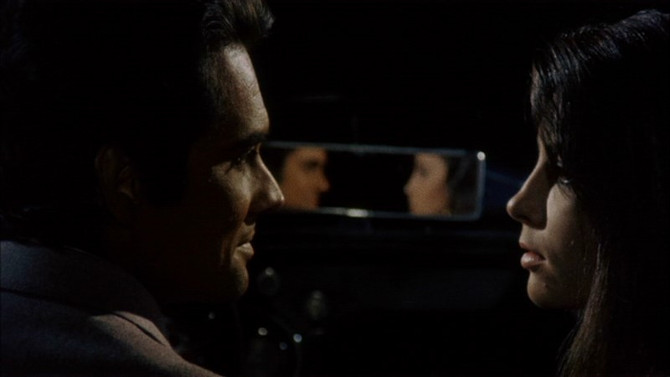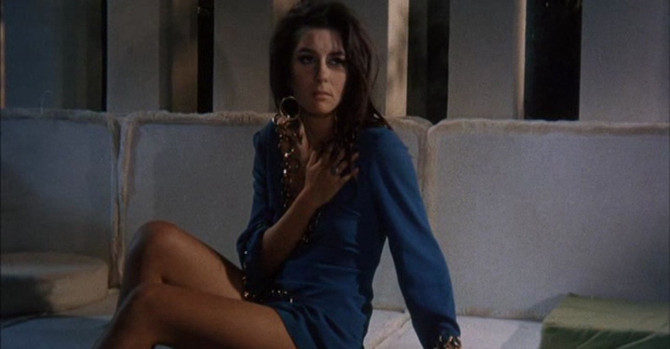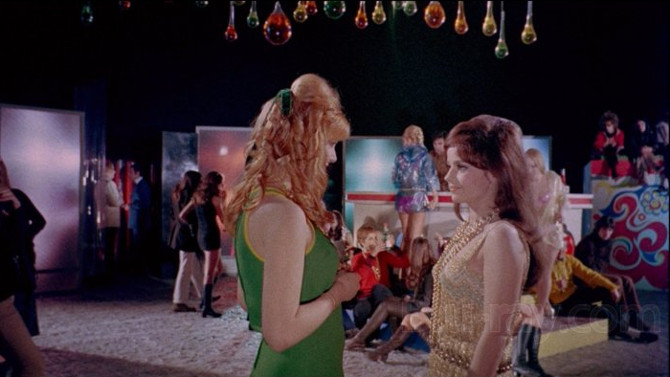An Italian sex comedy with some class – I know, I know, that sounds like an oxymoron, the great Mario Bava (Black Sunday) co-adapts and directs Four Times That Night (1971), a film that structures itself in a similar way to Akira Kurosawa’s classic Japanese motion picture Rashomon – also, for a more modern example, think of the television series The Affair (starring Joshua Jackson, Dominic West and Ruth Wilson).
Looking at one fateful night, four individuals get a chance to tell their side of the story. Dealing with perspective and viewpoint, the narrative revolves around Gianni Prada (Brett Halsey) and Tina Brandt (Daniela Giordano), a wealthy man always on the prowl – this time spotting a pious young woman in Tina.
After pursuing her for some time, she agrees to go out on a date with him. . . though, like a stereotypical man, he pushes things. . . or does he? What we soon learn is that this is Tina’s memory of the evening.
Perhaps Gianni is actually a shy individual, a kind gentleman not made for the hunter/hunted game of love. It may in fact be Tina who is the vixen, a flirty tease with short skirt, playful eyes, and a more than active libido. Maybe she is the pursuer and Gianni is just the schmo being led into her web of lust. . . yet, this is Gianni’s rendition told to his friends – can he truly be trusted?
Our third perspective comes from the peeping Tom doorman (Dick Randall) of the complex Gianni lives in – a binocular using, rooftop spying, smut on the walls living, tell his friends what he has seen, type of guy. Constantly being annoyed due to the building’s faulty outdoor lock, he uses these annoying interruptions to learn of the girls Gianni brings home, in this case, Tina. . . yet, at this point, the story is muddied. Each earlier perspective is twisted in an unexpected way by the twisted doorman – but is this miscreant to be trusted any more than the above two (even though he is an outside witness)?
Lastly, a psychoanalyst (Calisto Calisti) takes a shot at the sordid tale (I know, a bit out of left field), a Freud-like, Noah’s Ark-example using doctor with his own analysis of their behaviour, the flawed facts, and the muddied water that comes from different viewpoints (the weakest part of the film).
Intriguing in its details, it is exciting to see how the little things change in every story. . . a scratch on Gianni’s forehead, how the new couple left the hopping nightclub, a visit from quirky neighbours Giorgio (Michael Hinz) and Esmeralda (Pascale Petit), how the drinks were made, what Tina’s mother, Sophia (Valeria Sabel), acted like upon meeting Gianni, how Tina’s dress got ripped, and a slew of other things. It is fascinating to watch a visually skilled filmmaker like Bava work with these threads, teasing the audience as they try to analyse the situation and figure out whose side they fall on.
A tad tame by today’s standards, and, as you can probably guess, not the best film to ever be made, there is still a lot to like here. Of course, it features Bava’s iconic colourful flair, his composition a feast for the eyes on top of the little bit of skin you do see (another staple of the 70s, at points he utilizes pinwheel transitions). Then there is that early seventies culture, an amalgam of a jazzy, swinging score by Coriolano Gori, the shagadelic bachelor pad (with a chic design, it has a fantastic super-sized L-shaped couch, a multi-levelled monument-style bed, spaceship-like bathroom, unusually placed plants, and even a swing in the livingroom), the groovy, electric nightclub (as well as a less mainstream spot featured later in the picture), and the fabulous fashion – mod in every way. . . even the opening credits are worth mentioning, a playful, Rorschach test and animated character-filled montage that is out there in the best possible way.
A film that shows the varied career of Bava (not just a horror/thriller director), Four Times That Night will be essential watching for fans of the director, and should also be a fun time for anyone interested in checking out some unique style whilst visiting (or revisiting) the early 70s. So, check this one out, I’d love to get your perspective.
This film is in Italian with English subtitles



